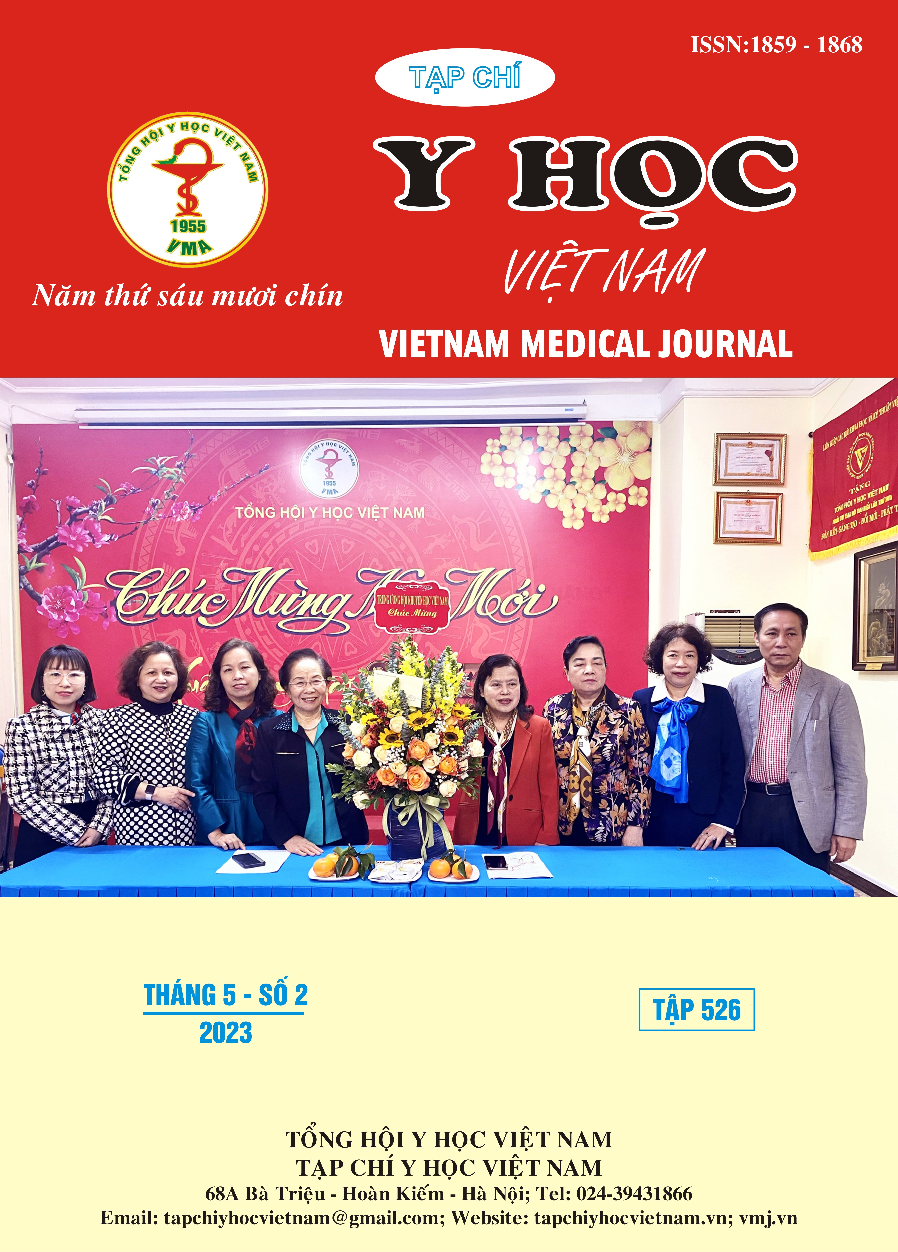CONSIDERATION OF ANATOMIC FEATURES ON SINUS MSCT IN THE BILAN PRE-ENDOSCOPIC SURGERY OF FRONTAL SINUS
Main Article Content
Abstract
Purposes: To evaluate the important anatomic features on sinus multi-slice CT scanner (MSCT) in the pre- endoscopic frontal sinus surgery of chronic sinusitis patients. Matherial and Method: The cross sectional descriptive study on the chronic sinusitis patients who underwent the sinus MSCT and the endoscopic sinus surgery. Then, the important anatomic features in the bilan pre-endoscopic frontal sinus surgery were observed and evaluated. Results: From 09/2020 to 9/2022, 200 chronic sinusitis patients who underwent the sinus MSCT and endoscopic sinus surgery at Hanoi Medical University Hospital. Among them, there was 13 patients with uncinate process abnormality, account for 6,5% of all study population. The Agger Nasi cells were observed on 170 patients, account for 85%. The anterior ethmoidal artery at the non-safety location was observed on 54 patients in the right side, account for 27% and on 55 patients in the left side, account for 27.5%. Conclusion: The important anatomic features should be evaluated in the endoscopic frontal sinus surgery included the uncinate process abnormality, the Agger Nasi cells and the location of the anterior ethmoidal artery (AEA). These anatomic features were very well observed on MSCT. The detection and consideration of these anatomic features on MSCT played an important role in the bilan of pre endoscopic frontal sinus surgery.
Article Details
Keywords
sinus anatomic features, sinus MSCT, frontal sinus surgery
References
2. Bradley DT, Kountakis SE. The role of agger nasi air cells in patients requiring revision endoscopic frontal sinus surgery. Otolaryngol--Head Neck Surg Off J Am Acad Otolaryngol-Head Neck Surg. 2004; 131(4): 525-527. doi: 10.1016/j.otohns.2004.03.0383.
3. Bolger WE, Butzin CA, Parsons DS. Paranasal sinus bony anatomic variations and mucosal abnormalities: CT analysis for endoscopic sinus surgery. The Laryngoscope. 1991;101(1 Pt 1):56-64.doi:10.1288/00005537-199101000-00010
4. Souza SA, Souza MMA de, Gregório LC, Ajzen S. Anterior ethmoidal artery evaluation on coronal CT scans. Braz J Otorhinolaryngol. 2009; 75 (1):101-106. doi:10.1016/s1808-8694 (15) 30839-9
5. Simmen D, Raghavan U, Briner HR, Manestar M, Schuknecht B, Groscurth P, Jones NS. The surgeon’s view of the anterior ethmoid artery. Clin Otolaryngol Off J ENT-UK Off J Neth Soc Oto-Rhino-Laryngol Cervico-Facial Surg. 2006;31(3):187-191. doi:10.1111/j.1365-2273.2006.01191.x
6. Shpilberg KA, Daniel SC, Doshi AH, Lawson W, Som PM. CT of Anatomic Variants of the Paranasal Sinuses and Nasal Cavity: Poor Correlation With Radiologically Significant Rhinosinusitis but Importance in Surgical Planning. AJRAm J Roentgenol. 2015;204(6): 1255-1260. doi:10.2214/AJR.14.13762
7. Azila A, Irfan M, Rohaizan Y, Shamim AK. The prevalence of anatomical variations in osteomeatal unit in patients with chronic rhinosinusitis. Med J Malaysia. 2011;66(3):191-194.
8. Junior FVA, Rapoport PB. Analysis of the Agger nasi cell and frontal sinus ostium sizes using computed tomography of the paranasal sinuses. Braz J Otorhinolaryngol. 2013;79(3):285-292. doi:10.5935/1808-8694.2013005210.
9. Jacobs JB, Lebowitz RA, Sorin A, Hariri S, Holliday R. Preoperative Sagittal CT Evaluation of the Frontal Recess. Am J Rhinol. 2000; 14(1):33-38. doi:10.2500/105065800781602948 Krings JG, Kallogjeri D, Wineland A, Nepple


